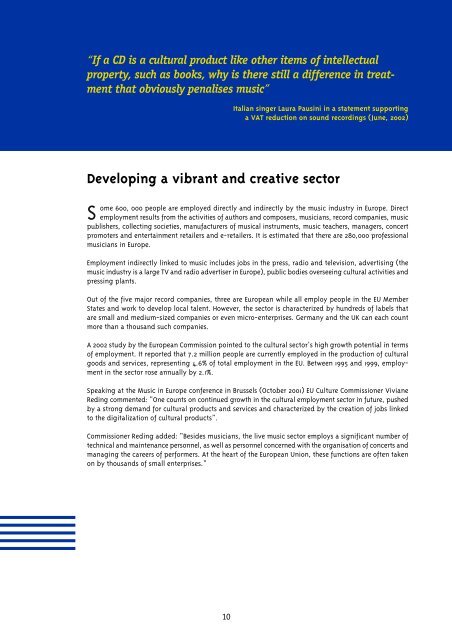give music a break - GERA -Global Entertainment Retail Association ...
give music a break - GERA -Global Entertainment Retail Association ...
give music a break - GERA -Global Entertainment Retail Association ...
Create successful ePaper yourself
Turn your PDF publications into a flip-book with our unique Google optimized e-Paper software.
“If a CD is a cultural product like other items of intellectual<br />
property, such as books, why is there still a difference in treatment<br />
that obviously penalises <strong>music</strong>”<br />
Italian singer Laura Pausini in a statement supporting<br />
a VAT reduction on sound recordings (June, 2002)<br />
Developing a vibrant and creative sector<br />
S ome 600, 000 people are employed directly and indirectly by the <strong>music</strong> industry in Europe. Direct<br />
employment results from the activities of authors and composers, <strong>music</strong>ians, record companies, <strong>music</strong><br />
publishers, collecting societies, manufacturers of <strong>music</strong>al instruments, <strong>music</strong> teachers, managers, concert<br />
promoters and entertainment retailers and e-retailers. It is estimated that there are 280,000 professional<br />
<strong>music</strong>ians in Europe.<br />
Employment indirectly linked to <strong>music</strong> includes jobs in the press, radio and television, advertising (the<br />
<strong>music</strong> industry is a large TV and radio advertiser in Europe), public bodies overseeing cultural activities and<br />
pressing plants.<br />
Out of the five major record companies, three are European while all employ people in the EU Member<br />
States and work to develop local talent. However, the sector is characterized by hundreds of labels that<br />
are small and medium-sized companies or even micro-enterprises. Germany and the UK can each count<br />
more than a thousand such companies.<br />
A 2002 study by the European Commission pointed to the cultural sector’s high growth potential in terms<br />
of employment. It reported that 7.2 million people are currently employed in the production of cultural<br />
goods and services, representing 4.6% of total employment in the EU. Between 1995 and 1999, employment<br />
in the sector rose annually by 2.1%.<br />
Speaking at the Music in Europe conference in Brussels (October 2001) EU Culture Commissioner Viviane<br />
Reding commented: “One counts on continued growth in the cultural employment sector in future, pushed<br />
by a strong demand for cultural products and services and characterized by the creation of jobs linked<br />
to the digitalization of cultural products”.<br />
Commissioner Reding added: “Besides <strong>music</strong>ians, the live <strong>music</strong> sector employs a significant number of<br />
technical and maintenance personnel, as well as personnel concerned with the organisation of concerts and<br />
managing the careers of performers. At the heart of the European Union, these functions are often taken<br />
on by thousands of small enterprises.”<br />
10


